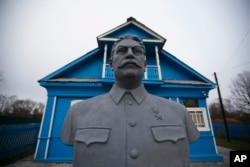Russia said on Tuesday it had canceled the release of Death of Stalin, a dark, satirical movie from British director Armando Iannucci, saying many
Russians would find it an insulting mockery of the country's Soviet past.
The film, which focuses on backstabbing and infighting among the Soviet leader's closest allies as they vie for power immediately after his 1953 death, had been privately viewed by culture ministry officials and advisers.
Vladimir Medinsky, the culture minister, said Tuesday that his ministry had received a number of complaints after the showing, which had prompted him to withdraw its general release license.
He said he had asked legal experts to make extra checks on its content.
"Many people of the older generation, and not only, will regard it as an insulting mockery of all the Soviet past, of the country that defeated fascism and of ordinary people, and what's even worse, even of the victims of Stalinism," Medinsky said in a statement.
He said his ministry had told the film's distributor that it was inappropriate to release the film on the eve of the 75th anniversary of the victorious World War II Battle of Stalingrad, in which so many Soviet soldiers died fighting for a
city that bore Stalin's name.
But he said the distributor had not heeded the warning.
"We don't have censorship," said Medinsky. "We are not afraid of critical and unpleasant assessments of our history. But there is a moral line between the critical analysis of our history and desecrating it."
Russia holds a presidential election on March 18 that incumbent Vladimir Putin is expected to easily win. Putin, who has dominated Russian politics for the last 18 years, has put patriotism at the center of his rule.
'A complex figure'
Stalin was repudiated by the Soviet Union after his death. He is recognized as responsible for the deaths of millions, from policies that included the forced collectivization of farms that caused famine, and from a succession of purges that saw mass executions and imprisonment at an archipelago of camps.
But the wartime Soviet leader is still associated by many Russians with the country's greatest achievements. Putin has called Stalin "a complex figure" and has said attempts to demonize him were a ploy to attack Russia.
Some of the people who attended the film's private viewing told Reuters they were disgusted.
"It's a despicable film," said Nadezhda Usmanova, head of the Russian Military Historical Society's department of information. The group was involved in organizing the pre-release screening.
"It's a bad film, it's a boring film, and it's vile, repugnant and insulting," Usmanova told Reuters.
Elena Drapeko, deputy head of the culture committee in the State Duma, the lower house of Parliament, said she found "extremism" in the movie.
"It's an effort to breed bad blood into the social harmony that has been reached in Russian society," said Drapeko, who earlier in her career was a popular Soviet and Russian actress.






